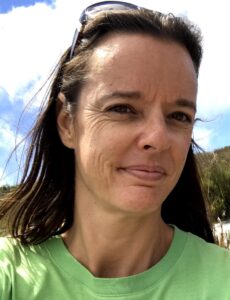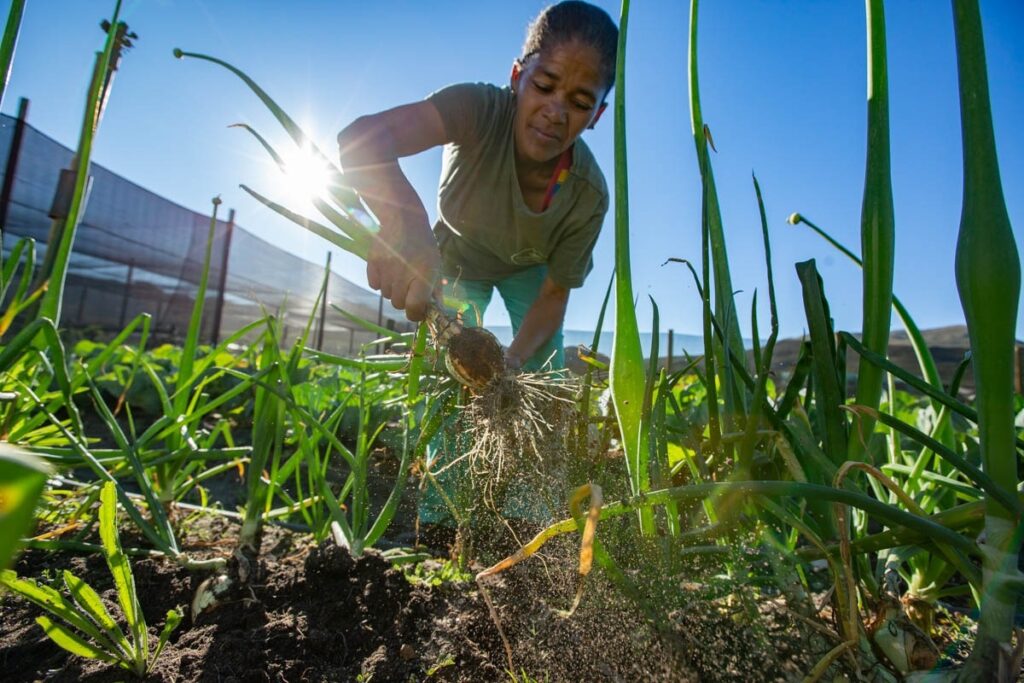Merna Booysen, Ocean View Organic Farm, Cape Town
Image credit: Y Our Stories – ‘Amplifying Our Narrative’
It’s good for you and it’s good for the planet
Summer weather generally makes us more health-conscious as we spend more time outside and make better food choices. It’s also an ideal time to embark on a journey towards a healthier lifestyle, both for ourselves and the planet, by choosing organic whenever we shop.
Organic is more than just a label; it’s a promise of trust and integrity that is firmly rooted in the principles of health, ecology, equity and compassion. The essence of organic farming lies in its guardianship of soil, water and biodiversity – at its heart it is a regenerative and sustainable approach that works with nature, not against it.
Organic farming is climate-friendly as it protects the soil, water and ecosystem
As growing organically works with nature, it helps support a more ecologically balanced and resilient world. Healthy soil is the foundation of any organic farm as it builds robust plants which can better resist droughts, insects and disease. By not using synthetic chemical inputs and prioritising soil health, organic farming enhances carbon sequestration and reduces greenhouse gas emissions.
Additionally, organic methods emphasise crop diversity, water health and agroecological principles that contribute to more adaptable and sustainable agricultural systems. By selecting organic products, consumers are playing a pivotal role in reducing their carbon footprint and helping to be better custodians of our planet.
Organic means clean, ethical products you can trust
Organic farming prioritises local supply chains, cultivating food and products close to their point of sale, thereby reducing transportation and pollution, while mitigating vulnerabilities within the food system. Smallholder farmers that are certified to the South African Organic Sector Organisation (SAOSO) organic standard within Participatory Guarantee Systems (PGS) groups contribute significantly to food security in South Africa.
Choosing organic means choosing a level of assurance that what you are getting is not only better for your wellbeing but also a vote for our farmers and producers that conserve and care for our environment. Opting for organic food and products is an intentional decision that champions quality, authenticity and transparency.
Organic certification offers assurance that customers can trust. To make sure you are buying organic produce, look for the ‘certified organic’ seal. In South Africa, we have second party certification, which works with short supply chains assured by PGS, and third party certification by an accredited certifying body to specific organic standards such as Control Union, Ecocert, Afrisco and CERES.
What is PGS?
Participatory Guarantee Systems, often abbreviated as PGS, may not roll off the tongue easily and their significance remains largely hidden from consumers. Yet these grassroots farmer networks are the unsung champions in the battle against urgent challenges like climate change, food security and environmental sustainability and are quietly and powerfully reshaping South Africa’s agricultural landscape.
Local PGS farmer groups play a significant role in helping farmers to get organic certification. It’s affordable for smallholder farmers, designed as a short supply chain for nurturing local organic produce into the market, thereby enabling farmers to get fair prices and consumers to get food they can trust.
These farmer groups actively participate in the process of certifying one another’s farms to the SAOSO organic standard. They avoid synthetic pesticides and fertilisers and take part in a transparent and participatory certification process, while sharing knowledge and skills with another. Instead of relying on government or expensive certification organisations, small-scale farmers in a community work together to ensure that their produce is grown organically.
The growth of PGS organic farmer groups in South Africa
Through a four-year project from 2019 to 2023, funded by the German development agency GIZ, SAOSO and PGS SA have represented South Africa as the country node of the Knowledge Hub for Organic Agriculture, with the goal of expanding the number of PGS groups and therefore scaling up the adoption of organic farming practices in the region.
Through this project, 22 new PGS groups were formed with one group outside South Africa, in Lesotho, representing 459 farmers. These farmer groups undertook 165 farm visits of which 122 were certified organic or organic-in-conversion.
Many of these PGS farmer groups supply organic retailers, markets, as well as community schemes that look after rural communities, schools, the elderly and hospitals. To see a map of all the PGS groups in South Africa, please look here: www.pgssa.org.za/pollinator-map
PGS is important in South Africa because it addresses the specific challenges and opportunities faced by small-scale farmers, contributes to rural development, supports food security and environmental sustainability, builds communities and enhances market access and consumer trust in organic products. It plays a vital role in promoting a more inclusive and sustainable agricultural system in the country.
Healthy and nutritious organic food
When it comes to your personal health, choosing organic is a step in the right direction. As organic farming practices prohibit the use of synthetic pesticides, herbicides and genetically modified organisms (GMOs), it means that the products you bring home are inherently free from harmful chemicals, enabling you to reduce your body’s pesticide and toxic load. These chemicals accumulate in the body as well as the environment, causing both to suffer from adverse health effects. Studies have shown that eating organic, even after just a short period, can radically reduce the pesticide load on your body.
Furthermore, organic products are often more nutrient-dense than their conventional counterparts. A study published in The British Journal of Nutrition found that organic fruits and vegetables contain higher levels of antioxidants, essential vitamins and minerals. Choosing organic means not only savouring delicious and wholesome products but also nurturing your body with the best nature has to offer.
By opting to shop or replace a portion of our customary purchases with items that are devoid of chemical pesticides and GMOs, we wield the power to effect significant positive change in our world that has an exponential impact.
Protecting our farmworkers and ‘unpoisoning’ our environment
Organic farming doesn’t use harmful pesticides or expose farmworkers to dangerous and persistent pesticides which can result in serious adverse health impacts. Farmworkers are in the front line and are most exposed to the deleterious effects of pesticides. Neighbouring communities are also at risk of exposure through pesticide drift if they live near a conventionally farmed area. Pesticide drift is a threat to human health as well as to wildlife and ecosystems.
UnPoison is a South African non-profit organisation and civil society network working to protect public health from the harm of highly hazardous pesticides commonly used in conventional agriculture, while promoting the development of alternative biological solutions for the sector.
According to a report by #Unpoison and SAOSO, South Africa is the leading pesticide user in Sub-Saharan Africa and a large quantity of the pesticide used in the country is concentrated in the Western Cape, which harbours fertile agricultural lands and is the mainstay of the country’s wine and fruit production. Three case studies of communities suffering the effects of intense spray drift in the Western Cape are documented.
In August 2023, #Unpoison published the first publicly available list of Highly Hazardous Pesticides used in South Africa. Highly hazardous pesticides are pesticides that have been identified as posing a high and unacceptable risk to human health or the environment. They are typically characterised by their acute toxicity, their potential to cause chronic health effects, or their persistence in the environment and are commonly highly restricted or banned in other regions for this reason.
There are 192 highly hazardous pesticides registered and legally in use in South Africa, of which only 16 have partial bans or restrictions. Over a third are banned in the EU because of unacceptable human health and environmental risks and 36 belong to the most hazardous class, which are substances known to have carcinogenic potential for humans, based on human health evidence and, in acute poisonings, can cause death. Read their full report.
There is a growing body of scientific evidence that suggests that we have crossed a tipping point for chemical contamination of Earth’s natural systems. This means that the levels of chemicals in the environment have reached a point where they are causing irreversible damage to ecosystems and human health. Supporting organic and agroecological farmers and farming practices removes harmful pollutants from the environment and protects farmworker and community rights to a healthy environment.
Choose organic to protect soil, water and wildlife
Organic farms are managed in a way that promotes biodiversity, protects wildlife, bees and other pollinators and cares for them as an integral part of a holistic system. When we purchase organic food and products, we create a demand which the organic farmer will fill, leading to a more readily available, larger supply of healthier products.
Embracing organic food and products in our routine shopping can be a transformative practice that offers improved wellness for you and your family, while supporting the sustainability of our local environment.
Whatever you are buying – from cotton buds to carrots – when you choose organic food, drink, beauty products, clothing, garden and input products, you choose products that support a healthier world.

Charmaine Koppehel, SAOSO and PGS SA Communications Office.
For more information: https://www.saoso.org/choose-organic/.For more information on Participatory Guarantee Systems in South Africa: https://pgssa.org.za

